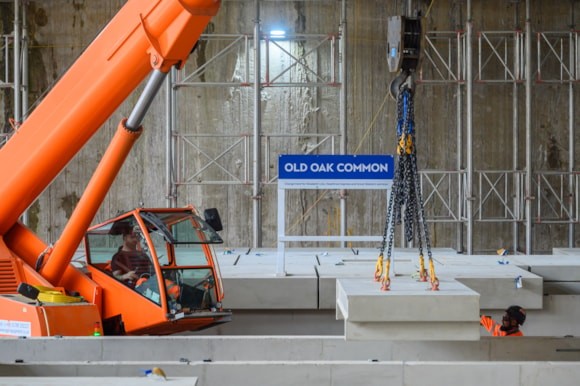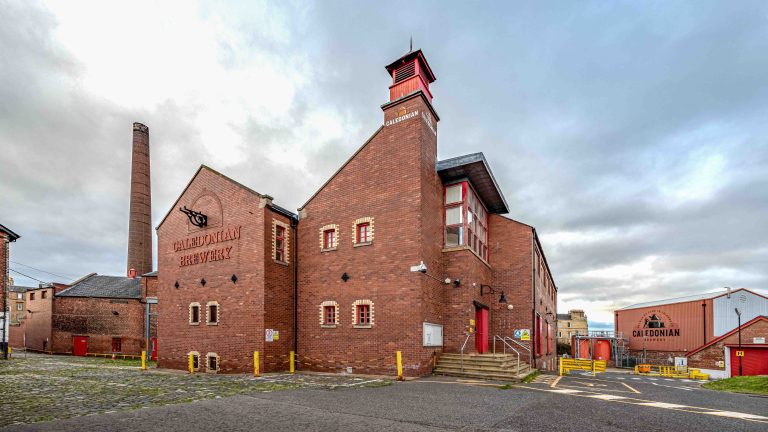HS2 yesterday revealed the first section of platform to be installed for Britain’s new high-speed railway. In the underground box at HS2’s Old Oak Common station, engineers have begun installing the platform slabs which passengers will use when boarding or alighting high-speed trains in the future. Six platforms are being built at the super-hub station in West London for high-speed services. Each will be served by HS2’s fleet of 400-metre trains. These are being built in advance of a further eight surface-level platforms for Great Western Mainline, Elizabeth Line and Heathrow Express services. All six high-speed platforms are being installed at the same time, with construction taking place from either end of the station box. They are laid out as three ‘island’ style blocks. The platforms are the first to be unveiled anywhere on Britain’s new high-speed railway and give a glimpse of what future passengers can expect when services begin running. To construct the platforms, 1.59m high walls, known as invert walls, have been poured. 1,960 pre-cast concrete slabs, measuring up to 4m by 2m, are then lifted into place on top. The platforms have a void below, allowing for services, such as electricity, to be installed within. The pre-cast concrete slabs are being made offsite by Explore Manufacturing in Worksop, Nottinghamshire, an example of how Britain’s manufacturing industry is building for the nation’s future. The station is being constructed by HS2’s station construction partner, Balfour Beatty VINCI SYTRA (BBVS JV), which began permanent work after the Transport Secretary gave the thumbs up to the station in June 2021. The structure of the huge 850m long underground station box at Old Oak Common was completed this year, including the 45,000 sq/m base slab. Despite recent progress, HS2 is currently undergoing a fundamental reset led by Mark Wild, HS2 Ltd Chief Executive, to make sure the railway can be delivered efficiently and for the lowest feasible cost. Huw Edwards, Delivery Director for stations and placemaking at HS2 Ltd, said: “The installation of the first passenger platforms represents a real step forward in taking HS2 from purely a construction project to the future of Britain’s railways. “Whilst there is still much more to work to do, standing where passengers will alight HS2 services is a reminder of what this railway will achieve – creating connections between people and places, that will benefit generations to come.” Steve O’Sullivan, Balfour Beatty VINCI SYSTRA Project Director at HS2 Old Oak Common station, said: “The installation of the first high-speed platforms at Old Oak Common marks a defining moment in the delivery of HS2. It’s a powerful symbol of progress, not just in terms of engineering, but also highlights the change in project focus from the current civil phase of the works to the building, fit-out and the Mechanical, Electrical and Public Health phase of the works. Our teams at BBVS are proud to be laying the foundations of what will become one of the UK’s most important interchange transport hubs.” Later this year, HS2 will begin installation of the eight platforms that will be used by conventional rail services – the Great Western, Elizabeth Line and Heathrow Express. When complete, the station will be one of the best connected in the UK, with the potential to reach over 100 stations in the UK and being the 42nd stop on the Elizabeth Line. The BBVS JV team is also working a level above the base slab where the platform construction is taking place to construct the ground floor level of the station. From there the superstructure of the station can be built, creating the vibrant station environment. Tunnelling work to connect the station to the HS2 network is being undertaken by HS2’s London tunnels contractor, Skanska Costain STRABAG JV. In the eastern section of the underground box, the team are preparing to launch two giant tunnelling machines towards Euston. In the western side of the box, the team will excavate a short tunnel connecting the station to the Victoria Road Crossover Box nearby using the sprayed concrete lining method. From there the new high speed line will run through the Northolt Tunnel. Economic research, published by HS2 earlier this year, shows that HS2 is spearheading a £10bn boost in the areas surrounding its new station site in West London. Within 1.5 miles of Old Oak Common Station, HS2 will be responsible for generating over 22,00 homes, 693,000 square metres of commercial floorspace, and 18,782 jobs, the research, conducted by Arcadis, found. HS2’s new station sits within the economic development zone where the Old Oak and Park Royal Development Corporation (OPDC) is delivering its masterplan for a new district in west London. Established by the Mayor in 2015, OPDC covers an area of 650 hectares and is working to maximise the regeneration opportunities, creating a positive legacy for communities. Building, Design & Construction Magazine | The Choice of Industry Professionals














